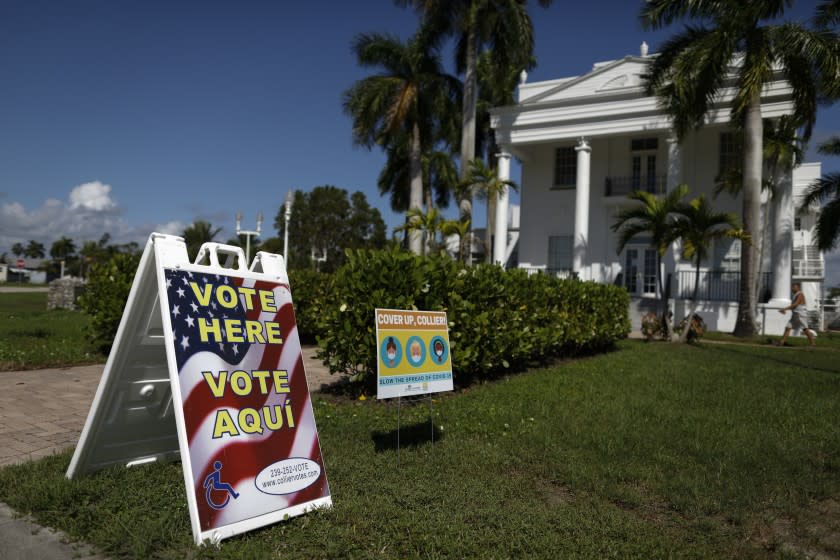Slavery, Uber and voters' power are on the ballot in states' voter initiatives

In a nation practically carved in two by partisanship, ballot measures are a nice temperature check on what voters seem to prefer when there aren't (R) or (D) labels attached.
That's how, in 2018, voters in states like Missouri picked Republicans to be their leaders while passing liberal-friendly ballot measures supporting a higher minimum wage, the legalization of medical marijuana, and the rejection of a right-to-work measure to weaken unions. Or there's the supposedly liberal bastion of California, where voters temporarily overpowered the courts in 2008 to ban same-sex marriage.
While there's no doubt that the runaway big political story of this election cycle is the combat between the Republican and Democratic parties for control of the White House and the U.S. Senate, there's plenty down ballot worth a look.
A titanic struggle over the future of Uber and gig work
Of all the ballot measures on offer to voters across the U.S. this year, Proposition 22 in California is the nation's true heavyweight title bout — a good old-fashioned showdown between capital and labor whose outcome could change the future of American work.
According to the nonpartisan election-tracking nonprofit Ballotpedia, campaigns for and against ballot initiatives across the U.S. have raised $1 billion this year. About 20% of that sum, around $200 million, comes from gig companies Uber, Lyft, DoorDash, Instacart and Postmates hoping to persuade voters to rewrite California labor law to protect their business models. Leading the opposition are labor unions like the Teamsters and Service Employees International Union and progressives who have likened the measure to "capitalist authoritarianism" that would make it all but impossible for the Democratic-led state Legislature to amend.
The heart of the issue is whether gig workers are independent contractors or employees. Companies like Uber were built around the premise that their workers are contractors: The drivers use their own cars and make their own schedules, with the company connecting drivers with passengers and collecting a middleman's cut of the fare. Don't like the work? Don't take it.
California courts and lawmakers have disagreed, arguing that such companies have dodged labor laws to cut costs by scamming workers out of employee protections like a minimum wage, overtime, sick leave, health insurance and the ability to form unions.
Proposition 22, if approved, would carve out an exception for "app-based drivers" to be contractors while providing those workers with a package of industry-specific benefits. If the gig companies lose, they say, the future of their companies' popular services are in doubt in the nation's largest market; if they win, their opponents fear a future in which companies everywhere have a playbook for erasing basic labor protections. Polling shows a tight race.
Atoning for past sins — symbolically, anyway
In some states, slavery will literally be on the ballot. Amendment C in Utah and Amendment 1 in Nebraska would remove "slavery or involuntary servitude" as potential punishments for crime in their state constitutions.
If that sounds strange, it shouldn't. The language mirrors what's in the 13th Amendment of the U.S. Constitution: "Neither slavery nor involuntary servitude, except as a punishment for crime whereof the party shall have been duly convicted, shall exist within the United States." (California's constitution has similar language: "Involuntary servitude is prohibited except to punish crime.") Contemporary critics of mass incarceration have argued the 13th Amendment, enacted after the Civil War, fell short of true abolition, saying look who's locked up.
But prison abolition these measures are not. Neither amendment, their proponents say, would meaningfully change their states' criminal justice systems or affect voluntary inmate work programs.
Other symbolic anti-slavery measures are on the ballot. How many people outside of Rhode Island knew that the state's legal name is "State of Rhode Island and Providence Plantations"? Voters can strike the plantation reference on Question 1.
In Mississippi, Measure 3 will ask voters whether to accept a new "In God We Trust" state flag to replace the previous flag, which contained a Confederate battle cross design.
Power struggles between voters and lawmakers
There's a natural tension between lawmakers and voters. Ballot measures let voters directly call the shots on a policy issue. But they also elect lawmakers to deal with those issues on a more nitty-gritty level. Sometimes the two groups disagree and try to overrule each other, sometimes arguing that the other side got cozened or coddled by special interests hoping to sneak in a favorable law.
In Florida and North Dakota, voters are being presented with unique requests to strip some power away from themselves. Amendment 4 in Florida would require constitutional measure to be passed not once, but twice, with a 60% majority vote both times. (The state already requires a 60% majority on ballot measures.) Amendment 4 is supported by business interests and opposed by liberal-aligned groups who hope to use the process to get around the state's GOP-controlled government.
It would also quietly add a money hurdle to direct democracy, because after all, what's more expensive than a winning ballot measure campaign? Two winning ballot measure campaigns.
North Dakota's Measure 2 proposes that the state legislature get a chance to approve or reject any ballot measure passed by voters. If the legislature decides to give voters a pat on the head for doing a good job, the measure becomes law. If not, like in Florida, North Dakota voters would have to approve the measure again to get their way. Measure 2 was put on the ballot by Republican lawmakers in the legislature; their Democratic counterparts were opposed.
This story originally appeared in Los Angeles Times.


